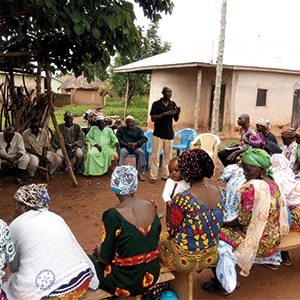The case of Abubakari Dokurugu and Langa community in Ghana
Radio Listening Groups: a vector for strengthening community seed revival and agroecological practices.
Back in 2013, ABN’s partner, RAINS [add link] initiated radio programmes as part of its work with smallholder farmer groups in communities of the Northern region. The learnings and experiences from these programmes helped shape the design of RAINS’ current participatory radio campaign programme under the SEWOH project.
These radio broadcasts are built on Community radio. The listening groups aim at communication and developing a learning approach, listeners help to drive the process. It allows them to engage in dialogue among themselves and with listeners in other communities around the key issues of agroecology and seed practices. The listener groups are usually a group of 20 to 30 men and women who gather around their radio on a set day and time. They have agreed to listen to a radio broadcast then afterwards discuss and share beneficial knowledge on the topic. In the process, farmers in listener groups communicate with the radio station using mobile phones to contribute, share their knowledge and seek for clarifications on the issues discussed. They then take steps to practice what is learnt.
Through such a radio listeners’ group, one farmer- Abubakari Dokurugu, has increased his knowledge and practice of agroecology and community seed revival practices.
Abubakari lives in Langa, a community in Northern Ghana. Climate change is threatening the livelihoods and food security of small holder farmers like himself. Small holder farmers make up 75 percent of the population in Northern Ghana, the impacts are already being felt; “The rainfall pattern is not the same every year anymore,” Abubakari said.
It is critical that farmers are accompanied to strengthen their knowledge on their indigenous climate change adaptive know-how and their seed practices. It is this that the radio programme sought to do.
To ensure listenership, RAINS donated radios and organised radio listeners’ groups. Each week, the groups would meet and listen to the programme together. Abubakari found listening in groups helpful. “If one farmer was away, they could learn from the rest what they had missed,” he explained.
Radio listening groups are also useful as they enable information sharing to all smallholder farmers in their communities. Access to a shared radio means that you do not need to own a radio set to benefit from the information, this is important as most farmers are unable to afford their own radio.
Previously, the only way to get information on farming was from visits from Agriculture Extension Officers from the Ministry of Food and Agriculture or trainings. Radio made information much more accessible for Abubakari and other community members. “We like the radio programme because we can get information from far away,” he said.
RAINS was also able to engage the listeners further; community members were interviewed about various farming topics; including, how to start farming, how to store agriculture produce, and how to carry out cultural practices on the farm. They were able to share their perspectives with other communities, a rare opportunity for rural farmers.
“If you sit in the community and discuss something, no one will hear, but if you put it on the radio and disseminate the information, it will go to the other communities and they will get the information,” Abubakari said, smiling.



